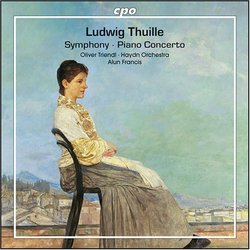| All Artists: Ludwig Thuille, Alun Francis, Ola Rudner, Orchestra Haydn di Bolzano e Trento, Oliver Triendl Title: Ludwig Thuille: Symphony; Piano Concerto Members Wishing: 1 Total Copies: 0 Label: Cpo Records Original Release Date: 1/1/2006 Re-Release Date: 1/17/2006 Genre: Classical Styles: Forms & Genres, Concertos, Symphonies Number of Discs: 1 SwapaCD Credits: 1 UPC: 761203700820 |
Search - Ludwig Thuille, Alun Francis, Ola Rudner :: Ludwig Thuille: Symphony; Piano Concerto
 | Ludwig Thuille, Alun Francis, Ola Rudner Ludwig Thuille: Symphony; Piano Concerto Genre: Classical
|
Larger Image |
CD Details |
CD ReviewsFinally! A Gap in the Discography Is Filled At Last! John Parker Marmaro | Spring Hill, Florida | 07/27/2006 (5 out of 5 stars) "From the time I first heard Ludwig Thuille's masterly Sextet for Piano and Winds in B-flat Major, Op. 6, thirty years ago, I have wanted to hear more music by this sadly neglected composer, a more traditionalist friend of Richard Strauss. Apart from a meager handful of recordings (quickly out of print) of the Sextet, though, for years nothing else was available. I read that Thuille, apart from large vocal works, and a good deal of chamber music, had written one symphony, the Symphony in F, and at least one piano concerto, and have been watching eagerly over the years, hoping that someone would finally commit them to disc. And at last! And well worth the wait too. Among his contemporaries, Thuille was esteemed as a teacher but his compositions were thought old-fashioned. (Indeed, so were Bach's-- the Baroque was already dissolving when Bach's great later works were written. For us, a hundred and more years later, it is immaterial if a composer's work was au courant; instead, it is the intrinsic value of the music that should matter.)
This Piano Concerto and Symphony are both wonderful, especially the Symphony. Interestingly, the Concerto seems to have the same idiosyncrasy as the Sextet: its first movement begins, if not in a lackluster way, at least, in a gentle and nonrhetorical way. And, as in the sextet, the later movements are all gems. Thuille was a lover of the music of Brahms and Schumann: yet he was a more engaging orchestrator, in my opinion, than either of those earlier masters, especially Schumann. Something of the sumptuous and yet luminous instrumentation of the Sextet is audible in both concerto and symphony. The slow movement of the concerto is lovely, and the finale is wonderful. The Symphony in F begins with a unison statement of the first theme, much weightier than the key would suggest; it is developed wonderfully. The slow movement is a masterpiece, dark and brooding sometimes, in an ABA'B'A" structure; the B sections begin when a majestic, almost Renaissance-sounding brass chorale erupts through the texture, like brilliant fireworks. (The opening of this movement is quite reminiscent of the opening of Dvorak's great Cello Concerto, but Thuille's symphony predates the Dvorak work by a decade.) In the Symphony's third movement, too (which is marked "Tempo di Menuetto"!), the minuet, a dreamy one almost as if danced by spirits, is followed by a trio with a very different mood and rhythm, of ethnic quality, perhaps recalling a Tyrolean folk-tune; and though still in triple meter, it is stressed quite differently fron the main minuet, to which it makes a fine contrast. The finale, again, is brilliant and high-spirited, reminding one of Dvorak again at times, even once in a while of Prokofiev!, and has (as throughout both works) frequent touches of the individual style and mood of this wonderful composer. The performances are splendid. The recordings are technically flawless. I might suggest listening to the Symphony first, then the Concerto-- my only quibble with the recording itself. The liner notes, though, are a disappointment, and tend to actually echo some of the disparaging comments made by Thuille's contemporaries. Don't pay any attention! Listen to the music-- and let me say that this is music that gets better and better with repeated hearing-- a sure litmus test for great music. So, if you are a lover of the Romantic idiom, especially as embodied by Brahms, Schumann (and at times, too, Grieg, Dvorak and Schubert), this will make a magnificent addition to your music library. Remember-- listen to the music several times (and really listen to it, pay attention...) and you will come to love it as I have." |

 Track Listings (7) - Disc #1
Track Listings (7) - Disc #1